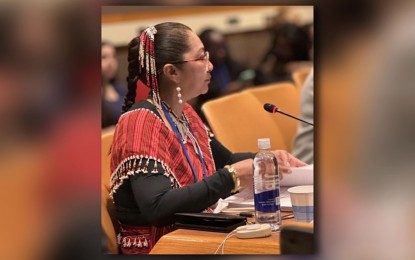
Jennifer Pia Sibug-Las, Bo-i of the Obu Manuvu and incumbent chairperson of National Commission on Indigenous Peoples (Photo courtesy of PCO)
MANILA – In the Philippines, women play an important role and often take the lead in mediation and conflict settlement within Filipino indigenous people communities.
Jennifer Pia Sibug-Las, Bo-i of the Obu Manuvu and incumbent chairperson of National Commission on Indigenous Peoples (NCIP), highlighted this during a forum advocating the active participation of women in customary and informal justice (CIJ) systems at the UN Headquarters in New York on Friday morning (Manila time).
“IP women often act as mediators in disputes, drawing upon their interpersonal skills and knowledge of customary norms to facilitate dialogue and reach consensus among conflicting parties. Their involvement promotes fairness and inclusivity in dispute resolution processes,” she said.
“Given this context, indigenous women are initiators of the justice, or conflict resolution process itself. Them being mothers to their family, expand their motherhood to their community as a whole,” she added.
In Talaingod town in Davao del Norte, Sibug-Las said the indigenous women were instrumental in the reconciliation of the Salugpongan Revolutionary Council and the Ata Manobo Tribal Council of Elders following 28 years of conflict.
“It was the women who initiated the healing and reconciliation. Both parties returned to their roots to heal and reconcile through customary law,” she shared.
“The symbol of a white chicken, known as pamalas, underscored the pure intentions and hearts of both parties as they jointly submitted to the conflict resolution, healing, and reconciliation ritual, marking a significant step towards peace and unity,” she added.
Sibug-Las said no less than the Philippine Indigenous Peoples Rights Act or IPRA provides that the indigenous women should have equal rights as men.
“Moreover, it recognizes the participation of indigenous women in the decision-making process in all levels, as well as in the development of society,” she said.
“Overall, Philippine IP women play multifaceted roles in customary informal and justice systems, serving as custodians of cultural heritage, community leaders, mediators, advocates for indigenous rights, and champions of gender equality,” she added.
The forum was organized by the International Development Law Organization (IDLO), Germany and the Philippines on the sidelines of the 68th session of the Commission on the Status of Women.
The IDLO said CIJ plays a crucial role in addressing the global justice needs of millions, with women forming the largest group seeking justice through these systems.
“By recognizing and promoting women's participation within CIJ systems, these mechanisms can also serve as vehicles for fostering women's leadership, contributing significantly to achieving gender equality,” it said. (PNA)
